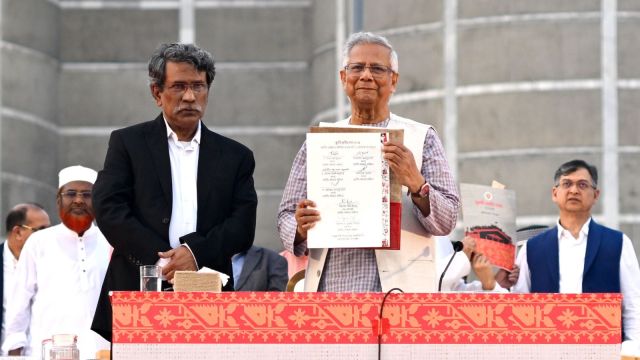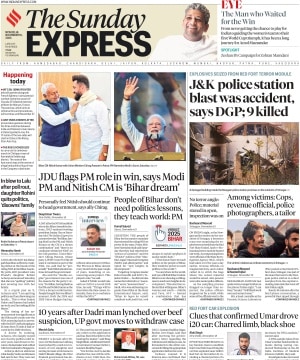Amid protest by Awami League, Muhammad Yunus says Bangladesh to hold parliamentary election and constitutional referendum on same day
Delivering a nationally televised address, Yunus said the decision was taken “after considering all aspects,” adding that holding both votes together would “in no way hinder the reform objectives.”
 Head of the Bangladesh's interim government and Nobel laureate Dr. Muhammad Yunus, center right, displays a political charter called 'July National Charter' at an event outside Bangladesh's national parliament complex in Dhaka, Bangladesh, Friday, Oct. 17, 2025. (AP Photo/Mahmud Hossain Opu)
Head of the Bangladesh's interim government and Nobel laureate Dr. Muhammad Yunus, center right, displays a political charter called 'July National Charter' at an event outside Bangladesh's national parliament complex in Dhaka, Bangladesh, Friday, Oct. 17, 2025. (AP Photo/Mahmud Hossain Opu)
Bangladesh will hold its national parliamentary election and a constitutional referendum on the same day in early February 2025, Chief Adviser of interim government, Professor Muhammad Yunus announced on Thursday, according to a report by Prothom Alo. The referendum will ask citizens to cast a single “Yes” or “No” vote on four key reform issues outlined in the July National Charter (Constitution Amendment) Implementation Order, 2025.
Delivering a nationally televised address, Yunus said the decision was taken “after considering all aspects,” adding that holding both votes together would “in no way hinder the reform objectives.” The announcement followed the interim government’s approval of the July Charter Implementation Order earlier in the day.
“After considering all aspects, we have decided that the referendum will be held on the same day as the upcoming national parliamentary election. In other words, like the national election, the referendum will also be held on the same day in the first half of February. This will in no way hinder the reform objectives,” Yunus said.
The Chief Adviser also confirmed that the referendum ballot question has been finalised. It will ask voters:
“Do you approve of the July National Charter (Constitution Amendment) Implementation Order, 2025, and the following proposals for constitutional reform as recorded in the July National Charter?”
The four reform proposals outlined are:
a. Institutional and electoral reforms – The caretaker government, Election Commission, and other constitutional bodies will be formed according to the process described in the July Charter.
b. Bicameral Parliament – The next legislature will be bicameral, introducing a 100-member upper house whose composition will reflect the proportion of votes received by political parties in the national election. Any constitutional amendment would require majority approval in the upper house.
c. Binding reform commitments – The 30 agreed reform proposals, including increased representation of women in Parliament, term limits for the Prime Minister, greater powers for the President, judicial independence, stronger local governance, and opposition leadership in key parliamentary committees, will be binding on all parties forming the next government.
d. Implementation of broader reforms – All remaining reforms under the July Charter will be implemented in line with the commitments made by political parties.
Yunus clarified that the referendum will serve as a public mandate for the reform process: “On referendum day, you will express your opinion on these four matters by casting a single ‘Yes’ or ‘No’ vote.”
If the “Yes” vote prevails, a Constitutional Reform Council will be created, comprising newly elected members of Parliament, who will also serve as council members. The Council will be tasked with amending the Constitution within 180 working days of its first session. Within 30 working days of completing the amendments, an upper house will be constituted based on the parties’ vote shares. The upper house will function until the lower house’s term ends.
Concluding his address, the Chief Adviser reiterated his government’s commitment to embedding the July National Charter into the Constitution, saying the process represents “a collective step toward institutional renewal, national unity, and a democratic future.”







